- By Alex David
- Mon, 14 Apr 2025 06:40 PM (IST)
- Source:JND
As the US-China tariff war intensifies, its ripple effects are now being felt in India’s telecom sector. The Department of Telecommunications (DoT) has reportedly issued a directive—referred to as a ‘Chinese request’—to major telecom operators including Airtel, Reliance Jio, and Vodafone Idea. The government is urging these companies to reassess their dependence on Chinese telecom equipment and vendors amid growing geopolitical tensions and security concerns. This move aligns with India’s ongoing efforts to bolster domestic infrastructure and reduce reliance on foreign, particularly Chinese, technology. With global trade dynamics shifting rapidly, Indian telecom operators may soon be required to make strategic decisions about their supply chains, partnerships, and future investments. The situation marks a significant moment in India’s telecom policy landscape.
DoT Directive to Telecom Operators
The Department of Telecommunications (DoT) in India has issued a directive to all telecommunications operators to furnish information regarding the presence of Chinese equipment within their networks. This development is a response to the escalating tensions in the US-China trade war. Specifically, the DoT has requested Airtel, Reliance Jio, and Vodafone-Idea to provide detailed information on the Chinese equipment utilised in their networks. The primary objective behind this initiative is to identify and mitigate potential security risks inherent in India's telecommunications infrastructure.
The Centre, as cited in the Economic Times, has for some time made it known that it will not facilitate foreign direct investment (FDI) from China, irrespective of the ongoing tariff war between the two superpowers.
There are 3 major concerns that arise:
i.) Security Concerns Drive Scrutiny
ii.) Legacy Contracts Under Review
iii.) Trusted Sources Mandate
Security Concerns Drive Scrutiny
Multiple sources indicate that the Indian government is tracking the Chinese hand on the Indian communication networks to mitigate exposure. Regardless of the trade war which could enhance India China trade, the government has made it clear that they will not promote Foreign Direct Investment (FDI) from China. This is a part of a DoT exercise carried out last year to gauge the stalk of chinese linked sim cards.
Legacy Contracts Under Review
Chinese vendors, barred from India’s 5G rollouts, continue to service portions of 4G infrastructure for Bharti Airtel and Vodafone Idea, as well as the 2G networks of Bharat Sanchar Nigam Ltd. (BSNL). As noted, “Huawei gets around Rs 600 crore from Indian telecom operators annually as maintenance charges,” Another source told ET. Despite being permitted to maintain the existing structures, these firms are not allowed any new agreements.
Trusted Sources Mandate
In 2021, following the India-China border clash, the National Security Council Secretariat has required telecom vendors to be classified as “trusted sources.” Approval has been given to firms such as Ericsson, Nokia, and Samsung while Huawei and ZTE have not. “The share of Chinese firms is coming down…if only equipment needs to be replaced will depend on the particulars given by the telcos,” an official stated.
The government intends to retain the obsolete Chinese equipment because of the expensive cost for operators like Airtel and Vodafone Idea. However, Chinese-chipped SIM cards in circulation with over 200 million still on 2G and some on 3G may need to be replaced eventually. India aims to become self-sufficient in 4G and 5G technology by fostering homegrown developments to reduce dependence on other countries and shifting the country’s position to telecom equipment supplier rather exporter.
That was it guys for this article, keep an eye out on Jagran English for more such updates!
Also Read : iPhone Maker Foxconn Plans Big In Noida : Seeking 300 Acre Land From Uttar Pradesh Government

